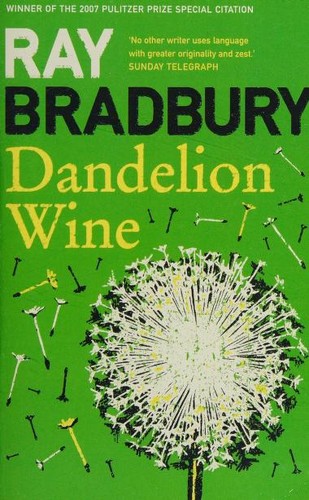English language
Published Jan. 2, 2008 by Harper Voyager.

English language
Published Jan. 2, 2008 by Harper Voyager.
The summer of '28 was a vintage season for a growing boy. A summer of green apple trees, mowed lawns, and new sneakers. Of half-burnt firecrackers, of gathering dandelions, of Grandma's belly-busting dinner. It was a summer of sorrows and marvels and gold-fuzzed bees. A magical, timeless summer in the life of a twelve-year-old boy named Douglas Spaulding—remembered forever by the incomparable Ray Bradbury.
Dandelion Wine is unique amongst the works of the popular author Ray Bradbury, in that it provides us with perhaps the clearest insight into the thoughts and feelings of the author. The book was published in 1957, perhaps over twenty years after the era which it is about, thus providing an inevitable theme of nostalgia throughout the book. The principal character, Douglas Spalding, and his brother Tom, encounter a series of adventures which are described in a crafted and distinguished manner to provide a philosophical tone …
The summer of '28 was a vintage season for a growing boy. A summer of green apple trees, mowed lawns, and new sneakers. Of half-burnt firecrackers, of gathering dandelions, of Grandma's belly-busting dinner. It was a summer of sorrows and marvels and gold-fuzzed bees. A magical, timeless summer in the life of a twelve-year-old boy named Douglas Spaulding—remembered forever by the incomparable Ray Bradbury.
Dandelion Wine is unique amongst the works of the popular author Ray Bradbury, in that it provides us with perhaps the clearest insight into the thoughts and feelings of the author. The book was published in 1957, perhaps over twenty years after the era which it is about, thus providing an inevitable theme of nostalgia throughout the book. The principal character, Douglas Spalding, and his brother Tom, encounter a series of adventures which are described in a crafted and distinguished manner to provide a philosophical tone throughout the book. The narrative is enriched by the experiences of individuals such as Leo Auffman, who attempts (unsuccessfully) to construct a 'Happiness machine'. Overall, the book provides a nostalgic sense of childhood and an understanding of the beauty of the world and all its features; in this way, it appears to be Bradbury himself reminiscing on his past. Douglas has similar traits to those Bradbury has later in life identified in himself, strengthening this interpretation.